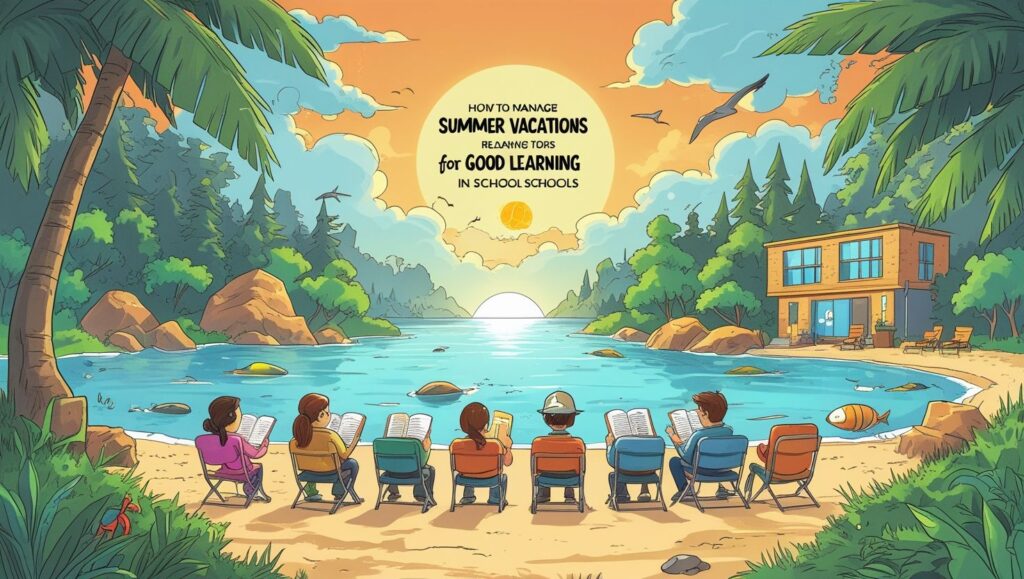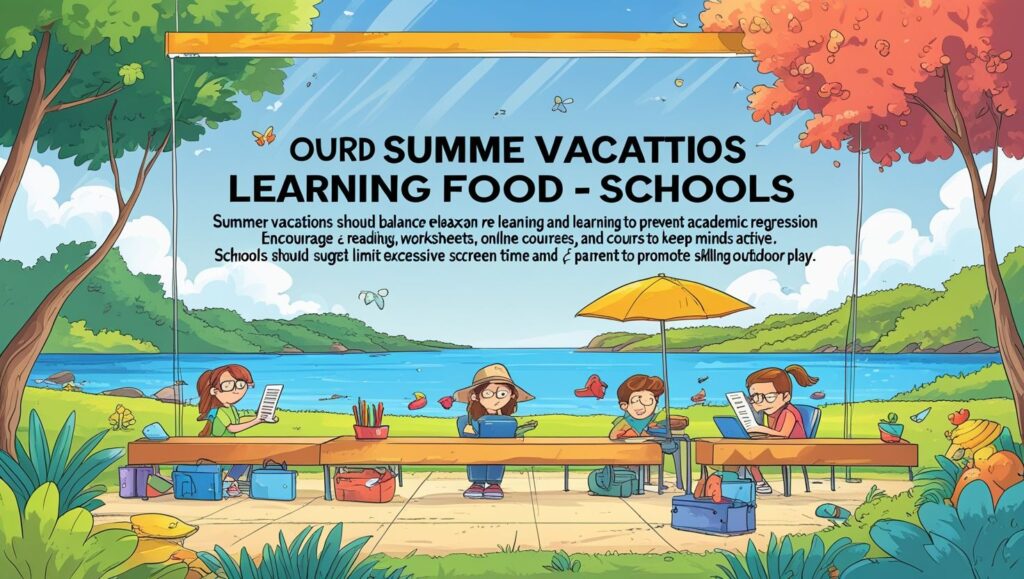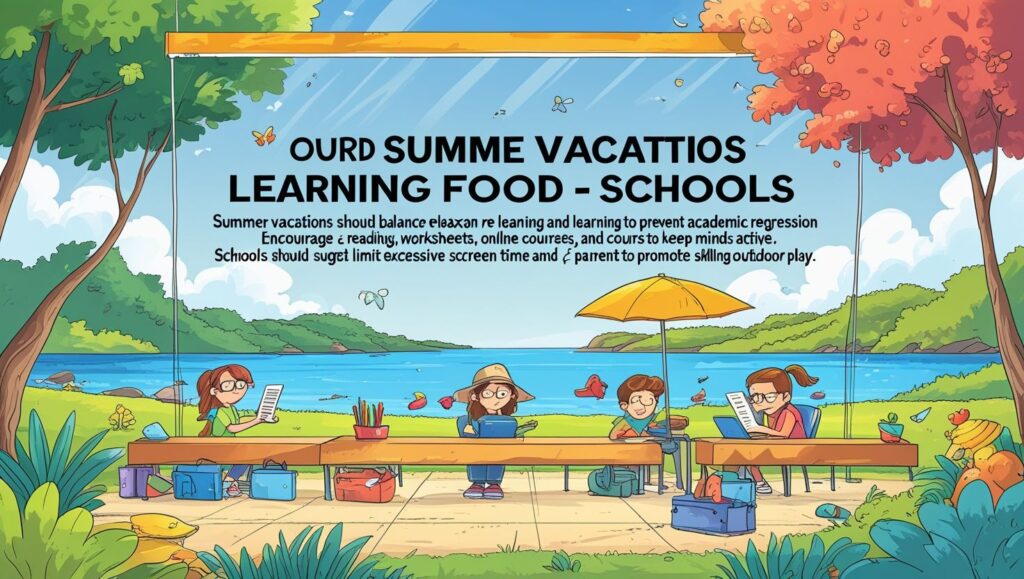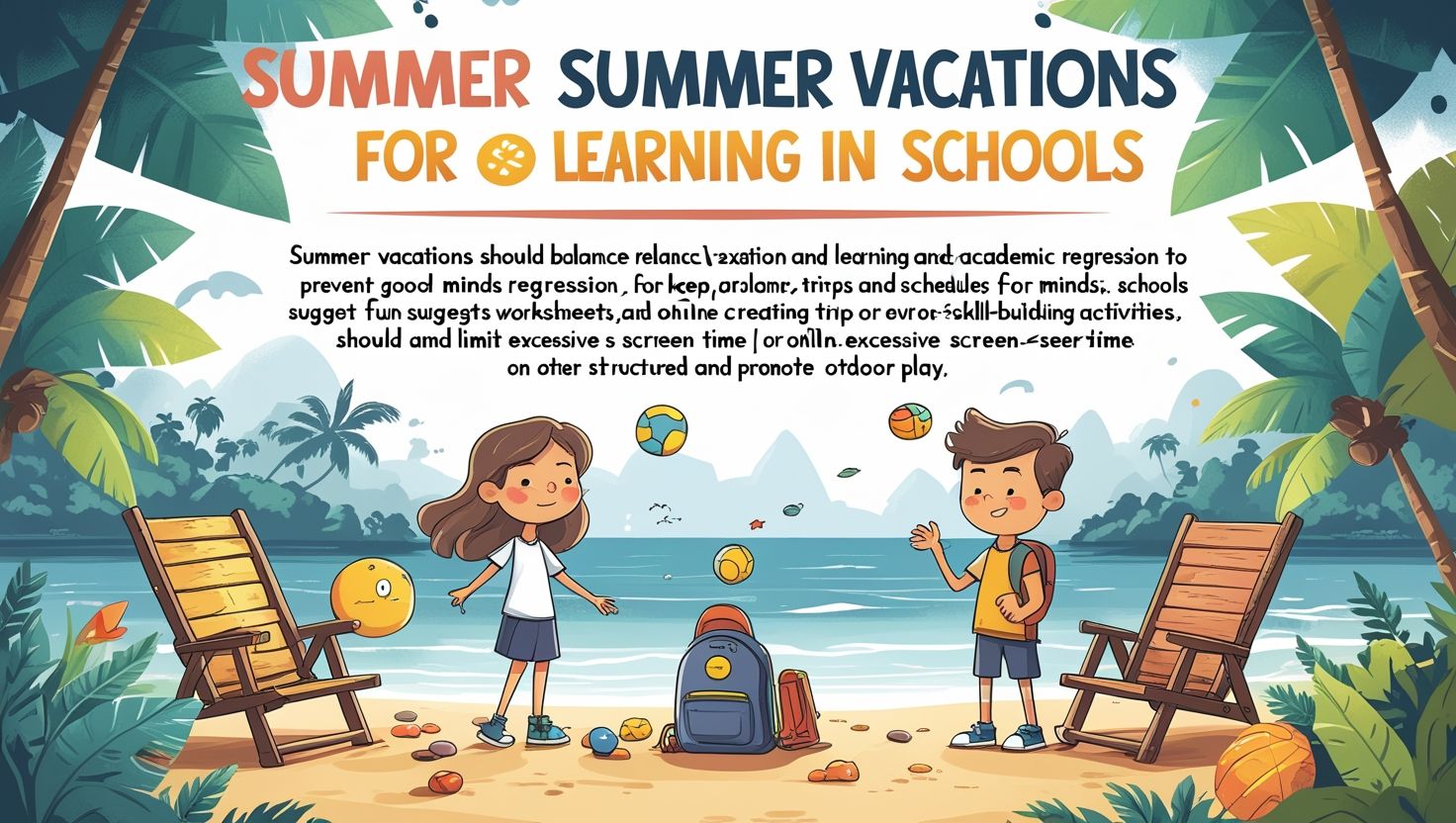Introduction
How to Manage Summer Vacations for Good Learning in Schools, Summer vacations offer a significant break from regular school routines. Although students enjoy time off, this period can also be utilized for meaningful learning. Importantly, the way schools plan this break can affect student growth. Therefore, schools must approach summer with a structured mindset. On the one hand, students need relaxation. On the other hand, they must also maintain academic continuity. Hence, balance becomes necessary.
Notably, long holidays without learning may lead to a decline in knowledge. In contrast, when students stay engaged, their learning improves. Additionally, summer vacations provide opportunities to explore new interests. As a result, students can build both academic and personal skills. Teachers and parents must coordinate to guide students well.
Moreover, schools can design summer plans to foster creativity. For instance, they may arrange camps, projects, or reading programs. These not only reduce summer slide but also develop life skills. In conclusion, with proper planning, summer becomes a season of enrichment. Thus, it is essential for schools to integrate learning into vacation time in enjoyable ways.
Planning Structured Learning Activities
Planning is key to successful summer learning. Without structure, students may waste time. Hence, schools should create detailed schedules. These can include study hours, breaks, and activity time. Moreover, structured learning does not mean regular classroom sessions. Rather, it involves flexible yet focused academic experiences.
Furthermore, planning boosts productivity. When students know what to do, they stay on track. Therefore, schools should design easy-to-follow activity charts. They may provide these to students and parents before vacations begin. Additionally, involving students in planning motivates them. When learners help choose activities, they show greater interest.
Besides academics, plans should include fun and games. For example, puzzle-solving, storytelling, or science experiments can be added. Consequently, students learn while having fun. Furthermore, online learning platforms can support structured learning. Schools can share age-appropriate content for daily learning goals.
As a result of structured planning, students stay engaged during the break. They avoid distractions and manage time wisely. In brief, with well-organized activities, summer learning becomes smooth and effective. Thus, structured planning should be a priority for all schools before vacations begin.

Encouraging Summer Reading Habits
Reading is one of the simplest ways to continue learning. During summer, schools should promote reading as a daily habit. Not only does it improve vocabulary, but it also enhances imagination. Moreover, it strengthens comprehension and critical thinking. Therefore, schools should create reading programs during vacations.
For instance, a summer reading challenge can excite students. Schools may assign age-specific books or allow free choice. Additionally, students can keep journals to reflect on their reading. As a result, they develop writing and analytical skills too. Schools can also provide a recommended book list before summer starts.
In addition, digital libraries can make reading accessible. Many students prefer eBooks, so schools may share reading links. Teachers can even schedule virtual reading circles weekly. Through these, students discuss books and share ideas. Consequently, peer interaction also supports learning.
Moreover, reading different genres expands knowledge. Fiction, history, science, or poetry all contribute to a child’s growth. Ultimately, encouraging reading prevents academic loss. It keeps students intellectually active. Hence, schools must include reading activities in summer plans. With regular reading, students return to school sharp and prepared.
Organizing Summer Camps and Workshops
Summer camps are excellent platforms for active learning. They combine education with enjoyment. Hence, schools should organize such camps during vacations. These camps can focus on different themes—science, language, technology, or arts. Not only do they promote learning, but they also enhance creativity and confidence.
Furthermore, workshops offer hands-on experiences. For instance, coding workshops teach problem-solving. Similarly, art camps boost imagination. When students learn through doing, they remember more. Therefore, experiential learning through camps is highly effective. Schools should design camps that match different interests.
Additionally, summer camps teach social skills. Through group tasks and team games, students learn cooperation. They build friendships, improve communication, and grow emotionally. Besides, these settings reduce screen time and physical inactivity.
Moreover, inviting guest speakers or experts makes camps exciting. Schools can partner with local artists, scientists, or athletes. Their sessions inspire students. In short, summer camps offer multiple benefits. Thus, schools must plan affordable and inclusive camps.
Even virtual camps can be conducted when physical ones aren’t possible. Through interactive tools, students can participate actively from home. So, whether in-person or online, summer camps make learning lively and memorable.

Utilizing Educational Technology and Online Resources
In the digital age, technology plays a big role in learning. During summer, schools can suggest reliable educational apps and websites. These resources help students revise old topics and explore new ones. In addition, many platforms offer games, quizzes, and videos. Hence, students enjoy learning in fun ways.
Moreover, online courses offer flexibility. Students can learn at their own pace. Schools may guide students to enroll in free or paid short courses. For instance, they can study languages, coding, or art online. These options improve skills beyond the regular curriculum.
Importantly, teachers can share weekly online tasks. These may include math puzzles, science videos, or history quizzes. As a result, students stay connected with school topics. Additionally, apps with tracking features let parents monitor progress. This ensures students remain committed.
Furthermore, live sessions or webinars can be arranged. Teachers can conduct virtual check-ins. These maintain teacher-student relationships. Consequently, students feel supported and motivated.
However, screen time should be managed. Schools must recommend limited and purposeful usage. With guided use, technology becomes a strong ally in summer learning. Overall, digital tools expand learning opportunities beyond classroom walls.
Promoting Skill-Based Learning and Hobbies
Summer is the best time to explore personal interests. Schools should encourage students to pursue hobbies or learn new skills. Whether it’s painting, cooking, photography, or gardening, all hobbies enhance development. These not only relax the mind but also build focus and patience.
Additionally, skill-based learning increases confidence. For example, learning to sew or fix things boosts self-reliance. Moreover, practicing music or dance supports emotional expression. Hence, such skills are essential for holistic growth. Schools can share hobby suggestions before vacations.
Furthermore, students can share their hobby projects with classmates. Schools may organize virtual exhibitions or presentations. This promotes sharing and appreciation. Consequently, students feel proud of their efforts.
Besides, skill learning also sharpens brain functions. When students learn chess, for instance, they develop logic. Likewise, writing poems sharpens language abilities. In this way, hobbies become learning tools. Parents and schools must guide students to select productive hobbies.
In conclusion, summer is not just for academic work. It’s also for discovering new talents. Thus, including hobby-based learning makes vacation time both educational and enjoyable.
Involving Parents and Guardians in Learning
Parents play a vital role in summer learning. Since students spend most time at home, parental support is crucial. Therefore, schools must involve parents in summer plans. Regular communication helps parents understand their role better. In turn, they can assist children effectively.
Moreover, schools may conduct online orientation sessions for parents. These can guide them on helping with study schedules, reading, or project work. Also, schools should encourage family learning. For instance, parents can read together with children. They can also explore documentaries or science shows as a family.
Additionally, when parents set routines, students stay disciplined. Even simple rules like fixed wake-up times or daily reading help. Schools should share tips to make routines enjoyable and stress-free.
Furthermore, parents can help in skill learning. Cooking, gardening, or DIY tasks can be done together. These activities build strong family bonds and teach valuable lessons. Moreover, parents should give positive feedback. Praise boosts motivation and interest.
In summary, summer learning succeeds when parents and schools work as a team. With active parental involvement, students stay encouraged. Thus, family engagement is essential for productive vacations.

Conducting Evaluation and Follow-Up Activities
Evaluation is necessary to track summer learning. Without it, schools may not know how effective the vacation programs were. Therefore, schools should conduct light assessments after vacations. These should not be stressful but engaging. For instance, quizzes, presentations, or project reviews can be organized.
Moreover, follow-up activities keep learning continuous. When students return, schools should dedicate some time to discuss summer learning. Classrooms may have sharing sessions. Here, students can talk about books read or skills learned. This encourages peer learning and reflection.
Additionally, teachers should give feedback. Recognizing students’ efforts builds confidence. In some cases, certificates or small rewards may be given. These motivate students to engage in future vacation tasks too.
Importantly, schools must analyze what worked and what didn’t. They can take suggestions from students and parents. This feedback helps improve next year’s summer planning. Moreover, evaluations reveal learning gaps. These can be addressed early in the new term.
In conclusion, evaluation is not about grades. It’s about understanding progress and improving strategies. Hence, post-vacation reviews are crucial. They bring closure to summer programs and prepare students for new academic goals.
Creating a Balanced Routine Between Rest and Study
While learning is essential, rest is equally important. Summer vacations are meant for relaxation too. Therefore, schools should help students create balanced routines. A mix of learning, play, and rest ensures well-being. Without balance, students may feel pressure or boredom.
Moreover, too much study may lead to burnout. Hence, short and enjoyable learning sessions are better. Schools can recommend activity-based tasks rather than strict homework. Additionally, breaks between tasks refresh the mind. Parents must also ensure children get enough sleep and physical activity.
Furthermore, routines build discipline. When students follow a set schedule, they manage time well. For example, a day can begin with reading, followed by hobbies and then rest. Such routines keep both body and mind active.
Besides, weekends can be kept study-free. This gives students a full break to recharge. Also, family outings or fun days add joy to routines. With balance, students stay motivated and happy.
In conclusion, summer learning should not be all about study. It should include rest, fun, and freedom. Schools must promote healthy and holistic vacation routines.
Conclusion: Making Summer Learning Meaningful
In the end, summer vacations can be powerful learning periods. With thoughtful planning, schools can turn this break into an opportunity. Structured routines, reading habits, skill development, and parental involvement all contribute. Moreover, using technology and camps enhances experiences.
Additionally, balanced learning reduces learning loss. It prepares students better for the upcoming academic year. Therefore, schools should not view summer as a gap but as a bridge. A bridge that connects one learning phase to another.
Furthermore, students who learn joyfully in summer carry that attitude into school. They become more confident, curious, and capable. Consequently, their overall performance improves. When teachers, parents, and schools collaborate, summer becomes meaningful.
Finally, schools must review each year’s efforts. With regular updates and creative planning, summer programs can keep improving. Hence, it is crucial to invest in summer learning strategies.
To summarize, managing summer vacations well shapes better learners. By combining fun with purpose, schools can ensure that no child misses learning—even during holidays.

Taşdelen su kaçak tespiti Kaçağı bulmak için geldiler, her şey sorunsuz geçti. https://trondol.my.id/read-blog/5891
Pretty! This was a really wonderful article.
Many thanks for supplying this information.
Hola! I’ve been reading your site for some time now and
finally got the courage too go head and give you a shout out from Dallas Texas!
Just wanted to say keep up the fantastic
job! https://glassi-App.Blogspot.com/2025/08/how-to-download-glassi-casino-app-for.html